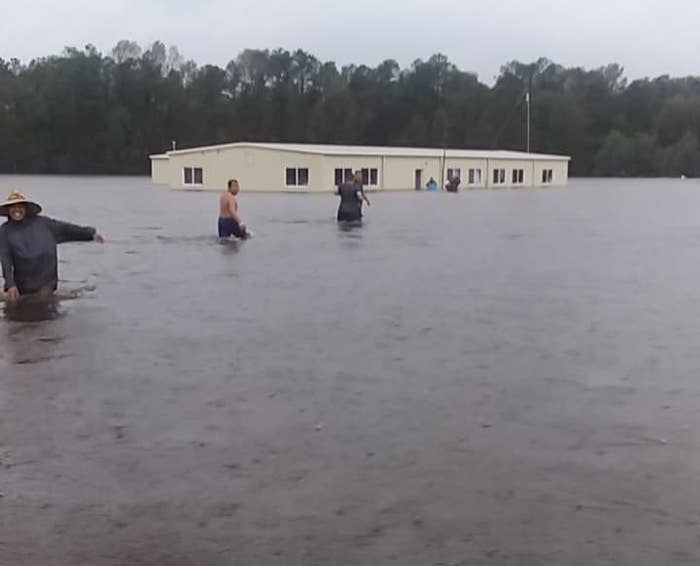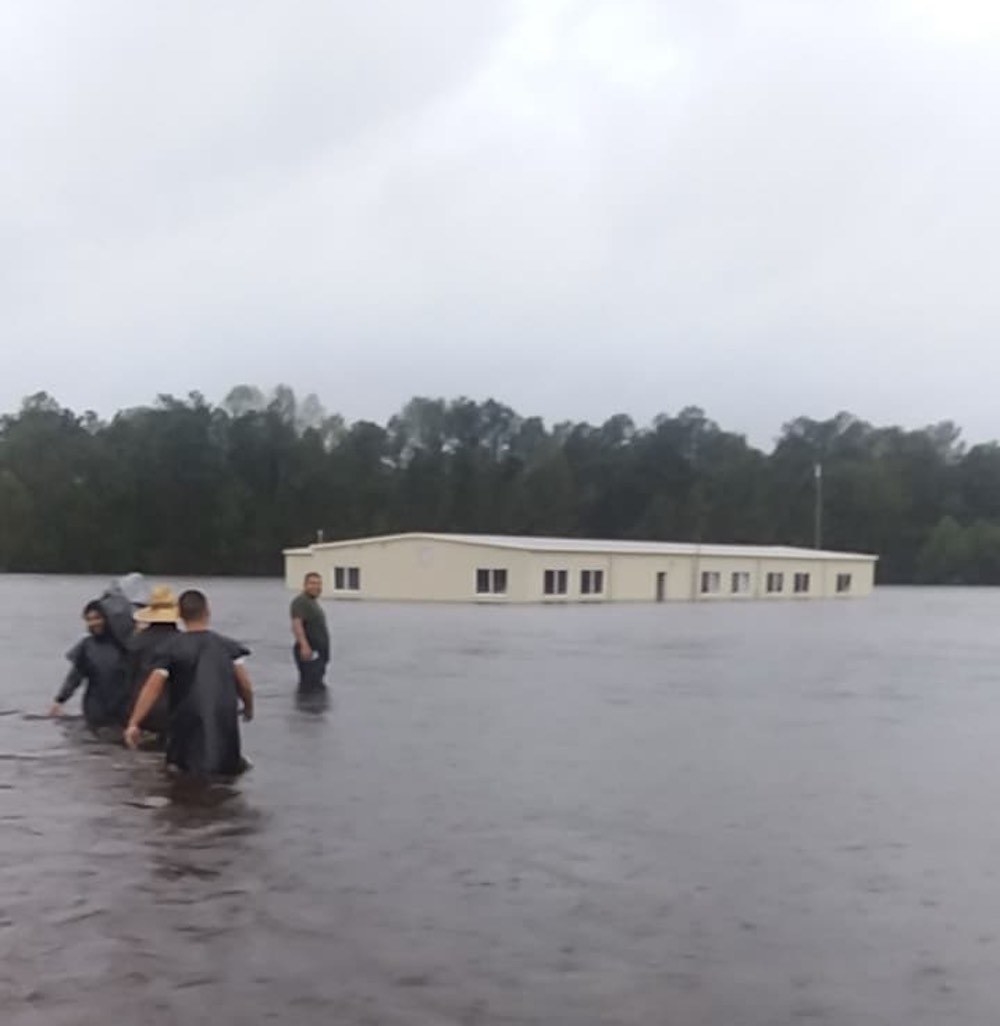
KINSTON, North Carolina — Hours after Hurricane Florence made landfall in North Carolina last month, battering the state with heavy rains and flooding, a group of migrant farmworkers woke up to find themselves in waist-deep water.
Isolated in a migrant labor camp in rural Jones County, far from the view of paved roads, the workers called 911 and told emergency officials they needed to be rescued. Then they waited for hours, watching as their mattresses, refrigerators, and other belongings floated by in the rising floodwaters.
But unbeknownst to the workers at the time, a county emergency management team had canceled an effort to extract them, after the owner of the farm where the men were working called county officials to say the laborers at the camp were “fine.”
“We were there in the rain and didn’t know what to do,” a worker who was among those stranded at the camp, and who asked to remain anonymous for fear of repercussions, told BuzzFeed News.
“The water started coming in, but we hoped that it would keep flowing and go down,” he said. “Once it got higher than a meter, we had to get out.”
Located deep in eastern North Carolina's farming country, Jones County was among the areas hardest hit by Florence. Bracing for the hurricane's impact, the county had declared a state of emergency on Sept. 11, four days before Florence made landfall, and ordered mandatory evacuations for its roughly 10,000 residents.
Men at the camp were told a hurricane was approaching, the worker told BuzzFeed News, but many of them — including himself — had never experienced one before. He said he was not aware of any evacuation order.

Eric Merritt, Jones County’s emergency management director, confirmed to BuzzFeed News that the county received the workers' 911 calls on the morning of Sept. 15, and said that first responders, including a swift-water rescue team, were initially dispatched to the camp in response.
The rescue crews had trouble reaching the location because of a road that had been blocked off by rising water, Merritt said. In the meantime, he said, the owner of the farm where the workers were located contacted the county to say that the group of roughly 35 to 40 men were fine.
“We contacted a swift-water team, and by that time the farm owner stated he made contact with [the workers] and they were fine, that they were just in an isolated area,” Merritt said. “That they had everything they needed as far as food and water.”
It was not clear why the farm owner, Randy Riggs, of Riggs Brothers Farm, called off the county's rescue efforts, or why workers at the camp stayed behind four days after the mandatory evacuation had been issued. Riggs did not respond to multiple messages from BuzzFeed News.
Asked why an emergency rescue would be called off on the word of the property owner, despite firsthand requests from the stranded workers, Merritt said he was not sure.
“He’s the actual owner and representative of the property,” Merritt said. “In that situation we’ll use the information from the most reliable case.”
Pressed on whether those asking to be rescued should be considered the most reliable source, Merritt conceded, “I guess in this case, yes."
The farmworkers weren't the only ones who tried to arrange rescues at the camp. As they waited for help to arrive, workers had reached out to advocates who work with the migrant community in eastern North Carolina, and asked them to relay the situation at the camp to officials.
Two migrant worker advocates told BuzzFeed News they were contacted by people at the camp on the morning of Sept. 15, and began to reach out to emergency services and other agencies, including the North Carolina Growers Association and the US Department of Labor, in the hopes of finding someone who could intervene to rescue the workers from the floods.
Melissa Bailey, an outreach director for the Kinston Community Health Center, which provides medical services to migrant workers in the region, told BuzzFeed News she received a call from one of the farmworkers sometime after 7 a.m. that morning. She said she then made multiple calls to 911 between 8 a.m. and 3 p.m., telling officials the workers at Riggs Brothers Farm needed to be rescued.
Caitlin Ryland, supervising attorney at Legal Aid of North Carolina, said her organization was also contacted about the situation at the flooded camp and asked to help reach county officials who could get rescue teams to the workers.
With emergency services in Jones County apparently unresponsive to the situation, Ryland said, she contacted the Labor Department to see if federal authorities might be able to intervene.
In the end, it was an employee with the North Carolina Growers Association — a trade group that contracts with farms to provide migrant labor to North Carolina farms — who eventually picked up the workers from the site late Saturday afternoon, and took them to a shelter set up at a community college in a neighboring county.
Both the worker BuzzFeed News spoke to and the NCGA said that the workers appeared to be unharmed at the time of the rescue.

Composed of about 700 farm owners in the state — including Riggs Brothers Farms — the NCGA coordinates the hiring of more than 9,000 seasonal migrant workers in the state annually, and is the biggest labor contractor in the country for the H-2A temporary agricultural visa program, according to the Department of Labor's Employment and Training Administration.
Before the hurricane hit, NCGA Deputy Director Lee Wicker said, the association had reached out to farm owners to remind them to take steps to protect their employees. “Our message to our growers was they needed to take the necessary steps to take care of these workers like they’re your own family,” he said.
Upon hearing about the stranded workers in Jones County, Wicker said, the group “immediately dispatched our field reps” to pick up the men.
“I think the grower should have done better than he did, but thankfully we were able to get them out of there,” Wicker told BuzzFeed News. “We’re really sorry it happened how it happened, and we wish the grower would have taken additional steps.”
The incident underscores the perilous position that many migrant workers across North Carolina found themselves in as Florence battered the state last month. Despite playing a vital role in the state's large agricultural sector, migrant workers have been largely ignored in the aftermath of the disaster.
Many of the workers BuzzFeed News spoke to last month said they have now found themselves out of work and running low on money. As seasonal workers, they are sometimes dismissed as only temporary guests, not residents of the communities where they can spend up to 10 months a year. Relying on the daily work provided by a temporary visa, many are also hesitant to ask for assistance, out of fear that doing so could affect their employment or immigration status.
Despite being encouraged to evacuate if they were in danger, Ryland said, many laborers feared they could be retaliated against if they left on their own, without the direction or help of a farm owner or labor contractor. As a result, many failed to evacuate before the storm hit, leaving themselves vulnerable to the rising floodwaters and other weather hazards as Florence unleashed torrents of rain and wind on the state.
“A lot of migrant workers, their lives are very dependent to their employer,” she said, including services like transportation to church, stores, or medical attention. “Most of them have no independent means of transportation and that can be very scary.”

